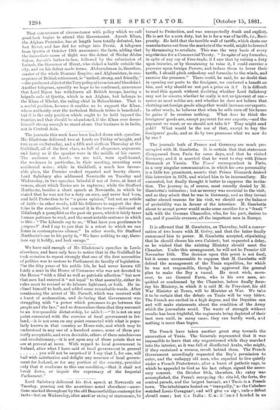Lord Salisbury delivered his first speech at Newcastle on Tuesday,
pouring oat the assertions -noted elsewhere—asser- tions markesIthroughaut by the Ad Beaeonsfieldian contempt for facts—but on Wednesday, atter another string of statements, he
turned to Protection, and was unexpectedly frank and explicit.. He is not for a corn duty, but he is for a war of tariffs, i.e., Reci- procity. He held that the terrible wall of tariffs, which shuts our manufactures out from the markets of the world, might be lowered bysthreatening to retaliate. This -was the very ;basis of every Inegotiation for a CommerciallTreaty. " Insspite of any formulas,. in spite of any cry of Free-trade, if I saw that by raising a duty apon luxuries, or by threatening to raise it, I could exercise a pressure upon foreign Powers, and induce them to lower their tariffs, I should pitch orthodoxy and formulas to theswinds, and. exercise the pressure." There could, he -said, be no doubt that in opening our ports to the foreigner, we conferred a benefit on him, and why should we not put a price on it ? It is difficult to read this speech without doubting whether Lord Salisbury may not be sincere, whether he really is not as ignorant of com- merce as most nobles are, and whether he does not believe that shutting out foreign goods altogether would increase our exports. In other words, he believes that when he sells corn off his farms he gains if he receives nothing. What does he think the foreigners' goodaare, except payment for our exports,—and the- payment we want, or we should not take it ? They might send gold ? What would be the use of that, except to buy the foreigners' goods, and so do by two processes what we now do by one ?


































 Previous page
Previous page